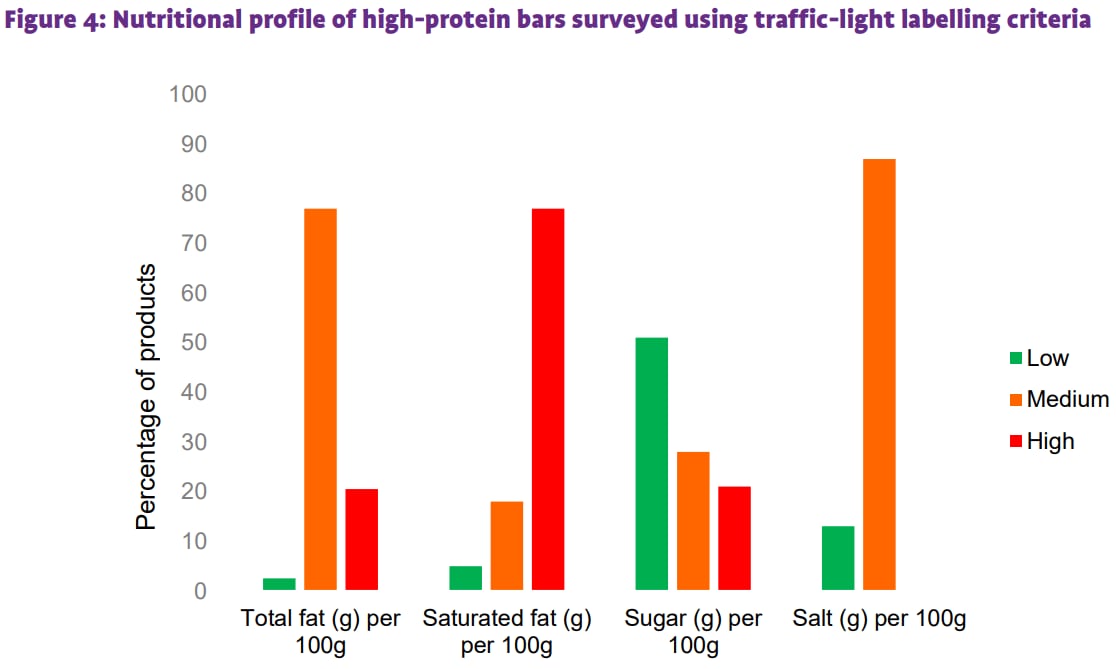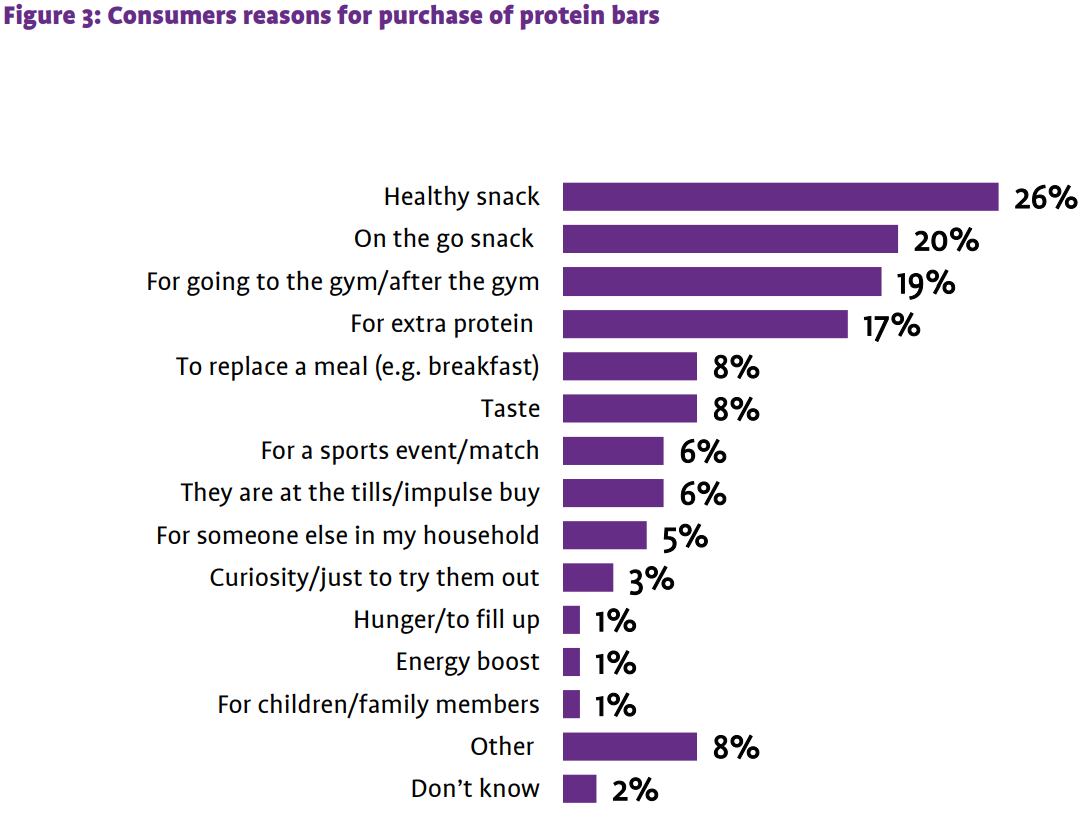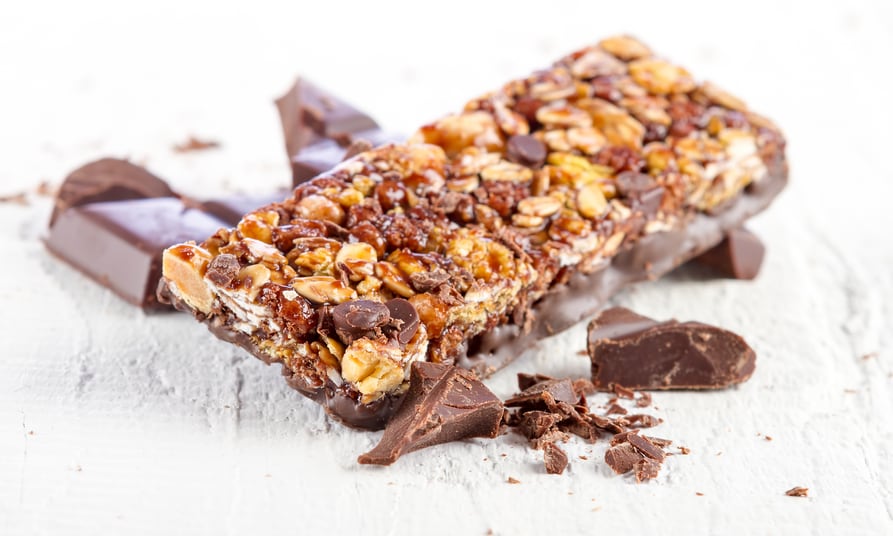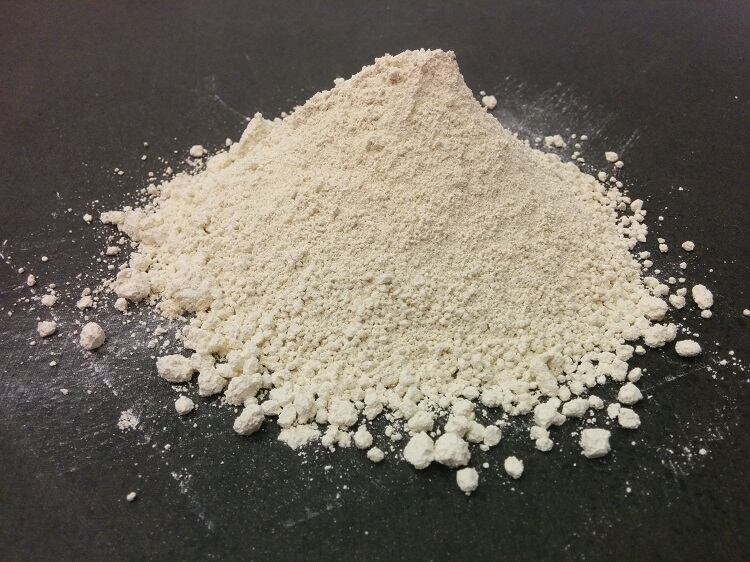Protein bars are not as healthy as people think, and most consumers are already consuming enough protein in their diets without needing to seek extra amounts from high-protein snack foods.
These are the conclusions of a report from Safefood, a group which aims to promote awareness and knowledge of food safety and nutrition issues in Ireland and Northern Ireland.
The report revealed that chocolate is the main ingredient in almost 40% of the protein bars it surveyed, with many also being high in saturated fat and containing added sugar and salt.
The research also found that over 1 in 3 people (37%) surveyed think protein bars are ‘healthy’. However, when comparing current protein intakes among adults with what’s recommended, both men and women are already consuming more protein than they need from their diet, stated the report.

High-protein diets have become increasingly popular
According to Mintel’s Global New Products Database, there was a 498% increase in products launched between 2010 and 2016 with a high-protein claim. On the island of Ireland, there was a 2% rise in consumers who reported following high-protein diets between 2015 and 2017.
Given that people are consuming these products for health and nutrition reasons, Safefood investigated the benefits of consuming extra dietary protein. Its research looked at the nutritional content of 83 high-protein snack foods and drinks available for sale in supermarkets on the island of Ireland. These foods included protein bars, yoghurts, yoghurt-style products and milk drinks. The research was also based on a survey of 2,000 consumers on the island of Ireland conducted in 2018 by Ipsos MRBI.
Safefood’s analysis concluded that high-protein products, in particular high-protein bars, are not as healthy as perceived by consumers. It added there is no consistent or conclusive evidence to suggest that consumption of protein above the recommended intake levels provides healthy individuals with additional health benefits.
‘People don’t need extra protein’
Dr Catherine Conlon, Director of Human Health & Nutrition at Safefood said: “We’ve witnessed a significant and consistent upsurge in the number and variety of foods and drinks for sale which claim to be ‘high-protein’. From bars to milks and yoghurts, high-protein foods have now become mainstream in our supermarkets. When we asked people about protein bars, a third of them thought they were healthy. However, many of these bars are, in reality, highly processed foods with a calorie content similar to that of a bar of chocolate.
“What’s also evident from dietary data is that men and women are already consuming more than enough protein in their diets and simply don’t need this extra, highly processed protein.”

According to the group’s research, consumers may be uncertain as to whether they are getting sufficient amounts, creating a potential desire to enrich their diet with additional protein from commercial sources. However, only the increased risk of sarcopenia among older adults provides the best evidence that some benefit that could be gained from higher protein intakes among this population group, it noted. It added there is ‘promising evidence of small positive effects on bone health for those over 50 years of age’.
Of the 39 protein bars surveyed, 38% listed chocolate as their main ingredient. 77% were high in saturated fat with 79% being a source of salt. The average bar size was 55g with an average price of €2.27 / 1.78 though some bars cost up to €3.00 / £2.49 each.
“Processed snack foods high in protein need to be combined with fat, sugar or salt in order to make them tasty,” continued Dr Conlon. “People would be better sticking to natural sources of protein in their diet, which tend to be much healthier. And if you need a source of protein as a snack, alternatives like some nuts, a small glass of milk or a yoghurt is the way to go instead of these foods with added chocolate.”
Protein bars belong on the ‘top shelf'
The report observed that the addition of whey, casein or soy protein as an ingredient in these products is most common in the cereal bar and snack bar category. Soy and whey protein, however, are unpalatable ingredients, unappealing to look at and unpleasant to eat – which provides a challenge for food product manufacturers.
This may account for the high fat, sugar and salt content discovered in high-protein bars. Sweeteners were identified as an ingredient in 69% of the high-protein bars. Added salt was listed on 90% of ingredients lists.
On average, high-protein bars are comparable to a small standard chocolate bar in their calorie, fat, saturated fat and salt content, observed the report. “Chocolate is on the ‘top shelf’ of the food pyramid. These foods are not needed for good health and should not be consumed every day but at most once or twice a week,” it said.
Conclusions
- Adults over 18 years of age on the island of Ireland are consuming enough protein.
- Commercial high-protein products, in particular high-protein bars, are not as healthy as perceived by consumers. These products are considerable sources of total fat, saturated fat and also provide salt and sugar. As such they should be considered a “top-shelf” food.
- There is widespread consumer perception that high-protein bars are healthy.
- There is no consistent or conclusive evidence to suggest that consumption of protein above the recommended intake levels provides healthy individuals with additional health benefits. However, protein intakes above the recommended guidelines may provide small positive effects for the elderly in relation to bone and muscle health.
- People can meet their daily protein intake requirements through consuming a varied diet that includes protein-rich whole foods at each meal.





